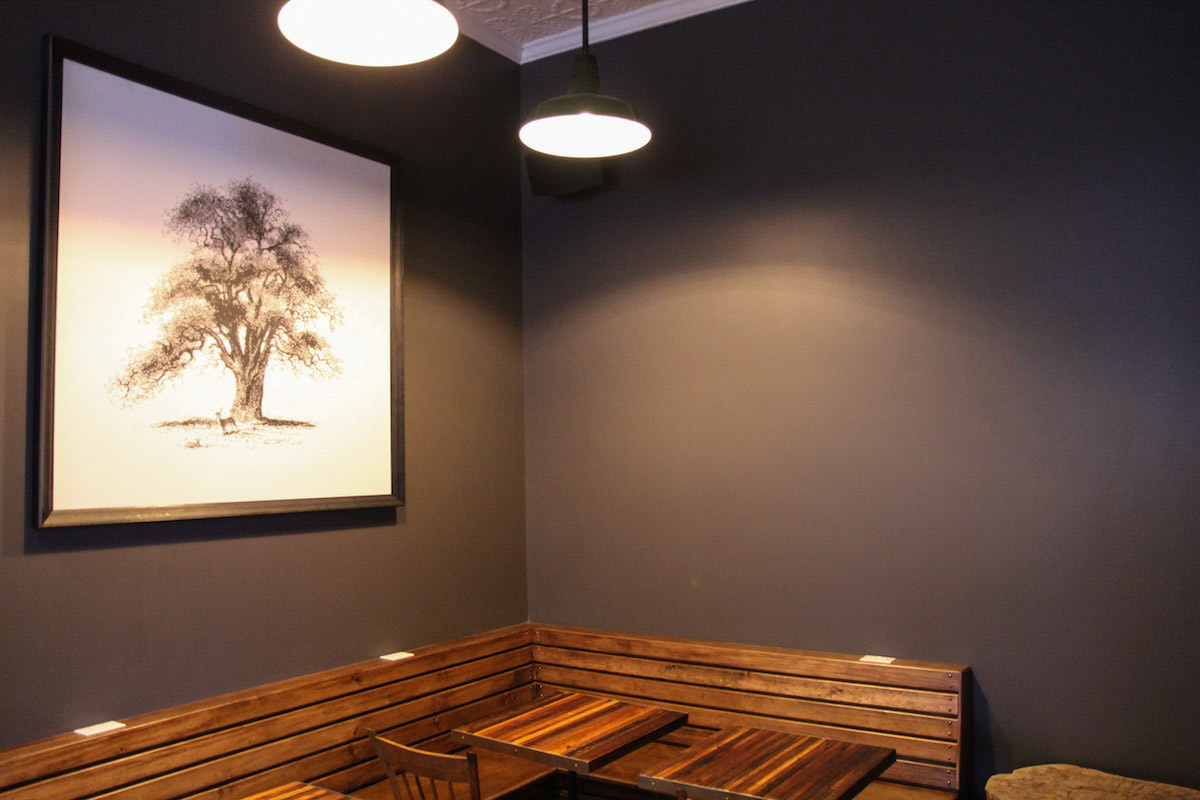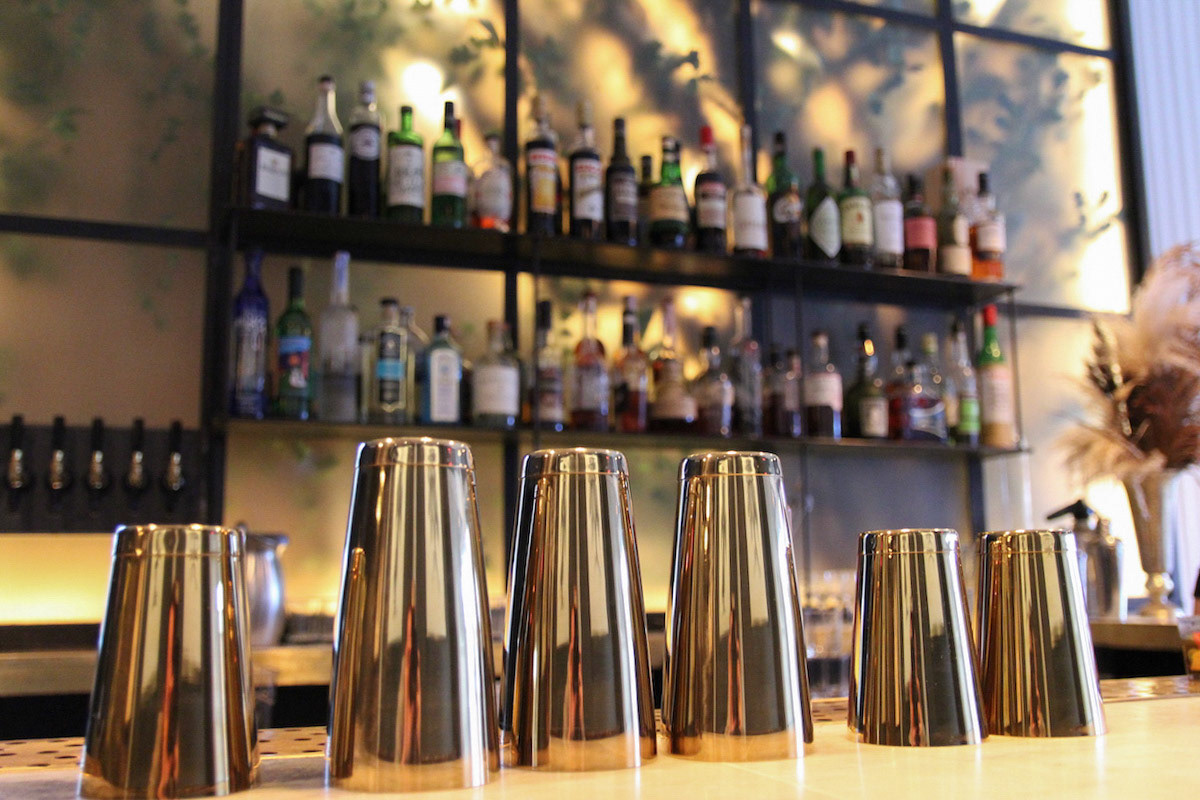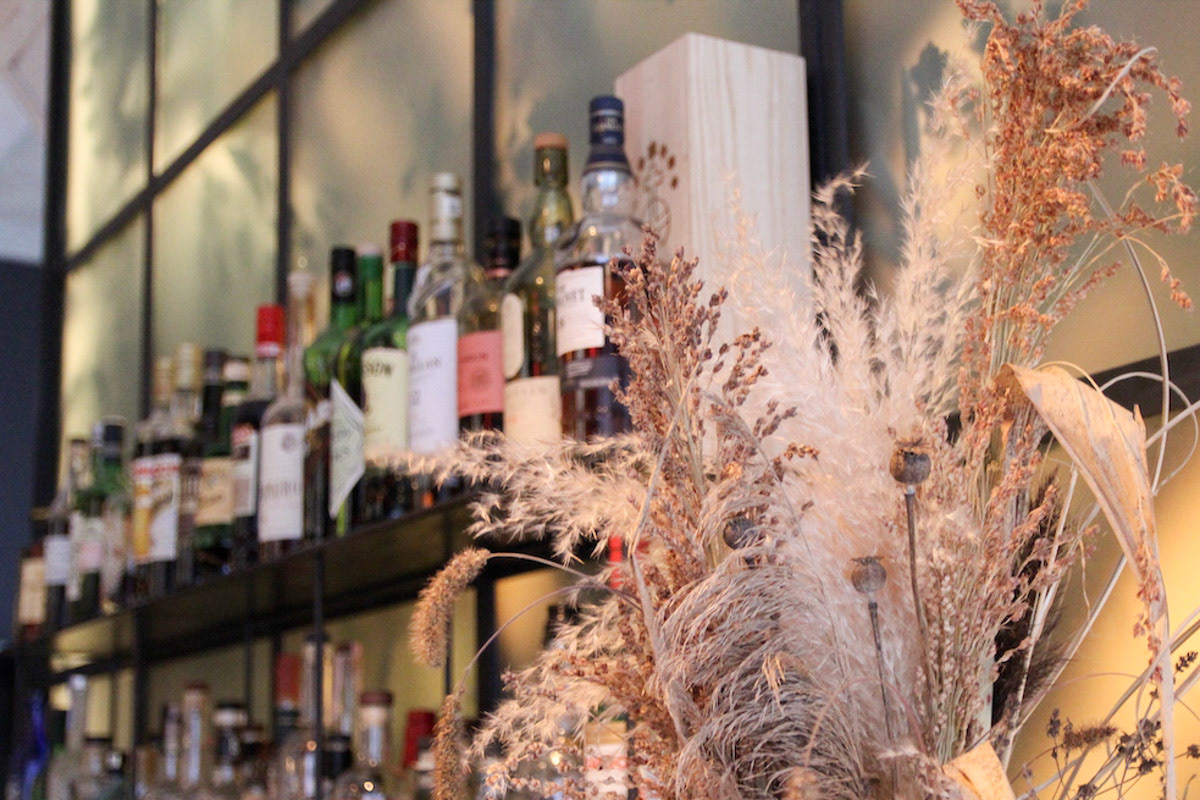By Isaac Lorton
Two months after planting its roots in the small 700-square-foot space next to the Rio Blanco Salon in White River Junction, the 24-seat craft cocktail hub of hospitality, Wolf Tree, is thriving with its Bruce Springsteen ethos and mad-scientist bartender.
Max Overstrom-Coleman — the boss of Wolf Tree — can be seen most nights behind the giant white and green marble bartop wearing a classic leather apron, concocting specialty drinks, and chatting with customers about flavor profiles, outdoor adventures, or whatever will “build trust.” A gleam shines in his eyes when he discusses the components of a well-balanced drink and the creativity it takes to make the perfect joy-inducing cocktail.
“Seeing that smile on people’s faces when they taste something they really like, their eyes light up — man, that’s such a good feeling."
Photo by Isaac Lorton
With dim lighting, loud (but good) music, and a return policy in the menu that states, “life is far too short not to be thrilled with your drink,” Wolf Tree’s atmosphere has been attracting steady crowds on weeknights and masses on the weekends. Three drinks are named after Bruce Springsteen songs and the lyrics to “Happy” (which also happens to be the first-dance song at Max’s wedding) appear in the menu. For Max, all of the details — from the apron he wears to the menu — create a welcoming ambience. An ambience, Max believes, Bruce Springsteen exemplifies.
“Bruce Springsteen brings people together in a way that is honest and has integrity. I feel like in this industry sometimes integrity is overlooked and it is something that I care a great deal about and want to make sure it is emphasized [at Wolf Tree].”

Photo by Isaac Lorton

Photo by Isaac Lorton

Photo by Isaac Lorton
Photo by Isaac Lorton
Though Max said his path to bartending may seem “disjointed” to most, he thinks his experiences as a scuba diver, sailor, underwater researcher, scientist, and doctoral candidate (studying seagrass ecology at Dartmouth) all culminated in the conception of Wolf Tree. The name itself comes from Max’s time as a TA for Bio 16 (or essentially ecology) at Dartmouth.
“We would take students out into the woods and do tree identification and succession and stream invertebrates. One term we used was ‘wolf tree.’ Wolf trees, usually you see them kind of standing out in the field alone, they were either allowed to grow or planted by farmers to provide shade to the pastured animals. What they end up being is community centers for not only pasture animals but all of the pasture community. And when the forest grows up around them, you can still see them within the forest.”
“Not only are wolf trees iconic of Vermont’s agrarian past, they are ecologically very important and the way I want the bar to be is similar to that. I want it to be a gathering place for everyone.”
Max’s interest in wolf trees and in establishing Wolf Tree stems from his lifelong love for Vermont. Max was born in Manhattan. His family moved to the east end of Long Island when he was in 6th grade. Throughout these formative years his family owned a home in Chelsea, VT, which they visited often. Max went to Camp Billings on Lake Fairlee during the summers and spent a semester at the Mountain School in Vershire. Something about Vermont and the Upper Valley called to him.
“I really identified with up here and was incredibly fortunate to have been raised understanding the dichotomy between a rural and urban existence, and I gravitated toward a more rural existence. I love it here.”
Photo by Isaac Lorton
After spending time in Maine, California, and at sea, when Max had the opportunity to come back to the area for a doctoral program at Dartmouth, he leapt at the chance. Max loved living here, but four years into academia, he realized he might eventually have to leave the place he calls home if he wanted to pursue professorship, and he didn’t want to do that. Max decided to take a year off from his doctoral program.
“After… mmm… not too long into that time off, I realized my quality of life had really increased significantly. I started to think that maybe a career change would be preferable.”
Max, who had been bartending at Carpenter & Main in Norwich, began asking around about possible spaces for a new cocktail bar; he learned that the Rio Blanco Salon was looking to subdivide its space. Though small, the space was the perfect fit for Max and White River Junction seemed like a great crossroads.
“I looked around at different towns, but at the end of the day, this is home and I wanted to bring this to the area. White River Junction since its inception has been a hub: a train hub, the junction of the White and the Connecticut River, there’s a lot of commerce that happens around here… It seemed like there was a need for just a cocktail bar.”
Photo by Isaac Lorton
Describing himself as someone who always needs a project, Max began actualizing his vision of Wolf Tree. It took six months from acquiring the space to opening, and it has been well received since its launch in early November.
Max is humbled by the response because, for him, hospitality comes from a place of love and a “deep, deep passion for bringing people together.” He’s happy that people keep showing up and returning that love.
Isaac Lorton is thrilled to be writing, editing, and photographing in the Twin State region. Simply, Isaac is happy to be here in this place at this moment with this group of people.
